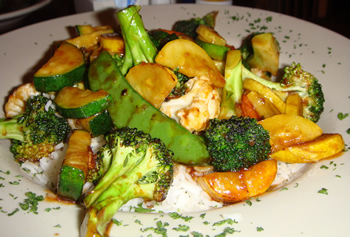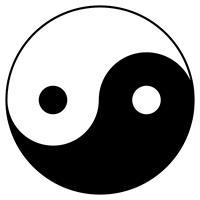Positive Health Online
Your Country

Healthy Eating According to Asian Wisdom
listed in chinese oriental medicine, originally published in issue 161 - August 2009
Have you ever noticed the shape of the average American compared to that of the average Asian? America is the most obese nation; the problem is growing and starting younger in life. The real treasure of the Chinese culture is that theirs is a 4,000-year long experiment with careful record keeping and dissemination of the lessons learned. They have studied diet for millennia and found that there are no superfoods; all foods are good in the right proportion. You will be surprised by how much their recommendations differ from what we are taught here.

Veggie stir fry
If we eat like the Asians, we will look like the Asians (thin). When they start eating like us, they start looking like us (not thin). The overriding principles are Balance and Moderation. You do not need to eat Chinese food every day. Chinese cuisine is different from Korean, Japanese and Vietnamese; but they all adhere to the same principles. The Asian diet consists of: Simple whole grains, slightly-cooked vegetables, and a little bit of everything else. Too much or too little of any one thing is not a good thing. The data supporting the healthfulness of this type of diet was revealed in a massive research project called The China Study.

Yin Yang
All foods have things that are good and bad about them. A good diet should be like a good stock portfolio – diversified. If you have the same thing every day or even every week, then you are overloaded in one sector. This makes you more prone to the dangers of that sector, and at the same time you are missing out on all the other good things happening in the market. So like a good portfolio, you should hedge your bets. Have a little of more different foods, then no single one can have too great an influence.
White rice is better than brown. Brown rice is white rice with a thick hull around it. This is kind of like eating a walnut and not taking the shell off. Of course, nature had to put some nutrients in to make that shell, but they're not for us. The nutrients in the hull have a very poor bio-availability (phytic acid blocks the absorption of the nutrients in the hull and the other foods we are eating). Our bodies will spend more time and effort trying to break down the shell, which will steal our energy and slow our metabolism. There are no nutrients in the hull that you can not get from vegetables. But while white rice is the best, it should not be taken to the exclusion of all the other grains. Rotate between them all (including brown rice), but white rice should be your staple. The more processed a food is, the harder it is for us to un-process; so simple grains should be taken more than breads and pastas.
Cooked vegetables are better than raw. It is true that cooking slightly will destroy a little of the nutrients (about 10%), but that remaining 90% is then unlocked and available. Whatever you put in your stomach that is cold and raw, you have to heat and cook. This takes your time, your energy, and slows your metabolism. We get all our energy from our digestion. To have to use our energy to process the food is inefficient, and we want efficient digestion. We want to get all the energy and life out of the food and excrete that which we don't need. The less efficient your digestion is, the more food your body will ask for. Cooking outside the body lightens the load and then we can just serve as the filters – sending the good stuff to the tissues, the bad to the tissue paper. Eat a wide variety of vegetables, mostly locally grown, fresh, and organic.
There are some who argue that we want difficult digestion: that by giving the body harder-to-digest foods, then the body will respond by increasing the metabolism. This sounds to me like pouring water on a fire so the fire will burn hotter.
Calories don't matter. Caloric science is inherently flawed. For one thing, it assumes that everyone absorbs 100% of the calories ingested. Different people will absorb and excrete more or less of any given food, so we are all absorbing a different amount of calories. If you have dysentery, it doesn't matter how many calories you eat; very few are going to stick.
The average person in China consumes between 25-40% more calories than the average American. Even the sedentary office workers have more calories and less obesity. This is because of the kinds of calories they consume, and how they are prepared. Some people argue that a calorie is a calorie, but that is drastically oversimplifying the issue. Calories ingested from natural sources will give you a more steady release of energy, satisfy your hunger, and facilitate appropriate elimination of waste. Eating cookies, snack foods, artificial sweeteners, sodas, etc, will spike our blood sugars, make us hungrier, and slow our digestion. You should never be hungry. Just keep yourself full of good, natural food.
You should eat a little red meat. Most Americans have too much red meat, and that is clearly associated with myriad health problems. Vegetarians almost have it right; they just go a little too far. Giving up meat usually will show a short-term improvement, but will almost always lead to a long-term deficiency. The Chinese recommend that we get two ounces, twice a week of specifically mammal meat. A little bit of fish and fowl are good as well, but we do need a little mammal in the rotation. White meat is not better than dark, chicken is not better than beef, egg whites are not better than yolks. We should have a little of everything. One famous Chinese medical doctor wrote that "Vegetarianism is best suited to monks, living in the shelter of a temple, spending their days in seated meditation". Those of us with a more active lifestyle need a little more of an active food source.
Regarding the ethics of meat eating, I believe that God loves carrots too. Everything has a life-force and wants to grow and reproduce. I'm sure that any carrot would rather stay in the ground and live to a ripe old age rather than being plucked from its home and diced into my salad. So it is not possible to 'do no harm' and survive. Everything has to eat something. We should always be grateful and mindful for the lives that are given so that ours may continue. Of course, our meat should be free of hormones and antibiotics.
Minimize or eliminate Dairy. Dairy is designed by nature for infants to turn into substance in the body. Humans are the only animal that has dairy after infancy; and it's not all humans. Dairy does have calcium, but it is overwhelmed by the amino acid Casein which actually robs the bones of calcium. Green leafy vegetables, green tea, and mild exercise are best for bone health.
In an adult body, dairy turns into phlegm. This can manifest in many different ways: fat, mucus, sinus infections, mental fog, respiratory problems; and it can congeal to form cysts, fibroids, and tumours. The Chinese understand Cancer and these other abnormal growths as being basically phlegm-balls, and they noticed more in the populations that had dairy. A little dairy won't kill you, but a lot of dairy is not good. Your number-one beverage should be water (room or body temperature), number-two should be green tea. Everything else, including coffee, should be occasional.
We have lost the sense of connection between what we put in our bodies and how they function. If you put cheap gas in your car and it started breaking down, you would buy better gas. Our bodies are breaking down, yet we continue to put in the same bad fuel. Think of it like building a house. Our cells are dying every day and new ones are made from the raw material (food) that we put in. If you were to build a house, you would probably want to get the best-quality lumber you could find. You will be in your body a lot longer than any house, so it is very important to put good quality food into yourself as much as possible. This means simple, natural, organic, fresh; and free of pesticides, hormones, and antibiotics.
But diet is not the only factor in determining health. The three greatest factors that can push us out of balance are our: Diet, lifestyle and attitudes. So just like with the diet, our lifestyle should be balanced and moderate. Don't do anything too much, get some restorative time, get enough sleep, get a little exercise every day but not too much of any one exercise. And your attitude should be positive, forgiving, and flexible. Keep a wide perspective and an open mind. We are here to learn and to teach; no one has all the answers yet, so cut yourself some slack but try to keep learning. Don't be too quick to judge. Let go of stress (there's always fresh stress coming), and enjoy the ride.
Try and put the principles of the Asian diet to use in your life and you will see the benefits. Trust what has worked for millennia. Keep it simple, balanced, and moderate.

Comments:
-
Jeff C. Rosen said..
I take severe exception to your contention that white rice is better than brown, or more specifically, that industrially-polished white rice is better. When industrially-polished rice was first introduced, it resulted in an epidemic of beri-beri, which led to the discovery of B-vitamins, and to government requirements that the nutrients removed by polishing be restored before industrially-polished rice could be sold. Pre-industrial polishing methods likely removed far fewer nutrients and (perhaps) were an improvement over brown rice, but you're the only writer I've come across who claims that modern, polished rice is an improvement over brown rice. Further, it's my understanding that brown rice is gradually being re-introduced in Japan, because it's increasingly viewed as healthier than polished rice. I'm utterly astonished that anyone, anywhere in Asia (or anywhere else for that matter) now regards polished rice (even when nutrient-fortified) as superior to brown rice.